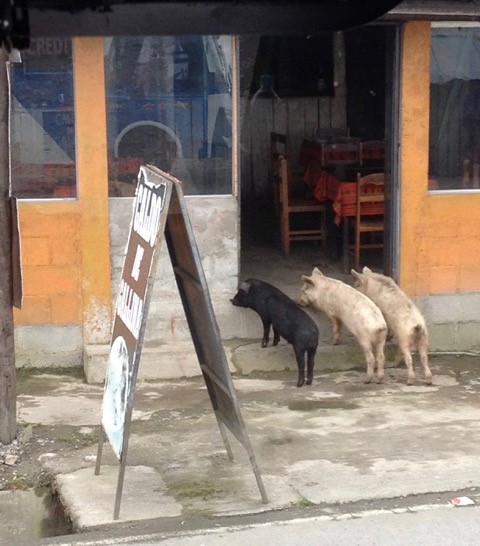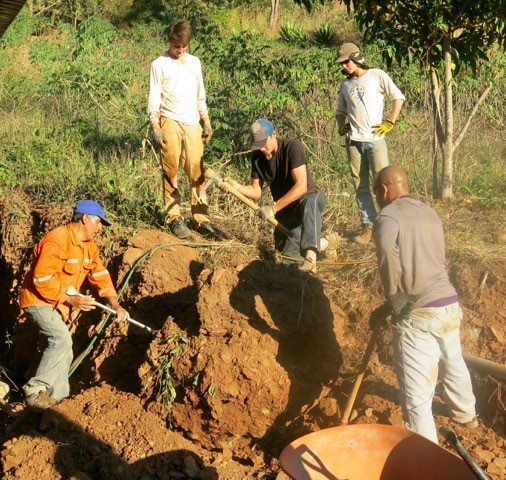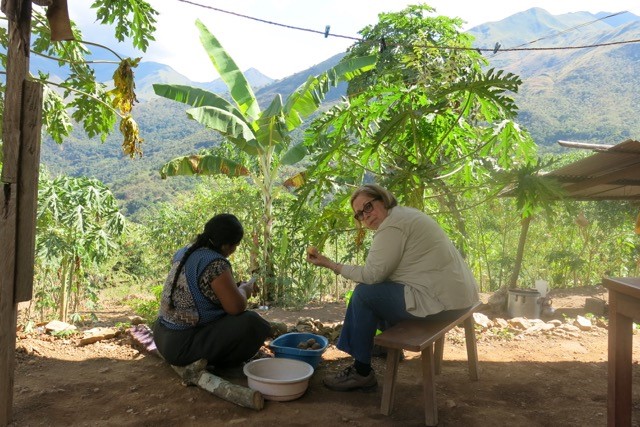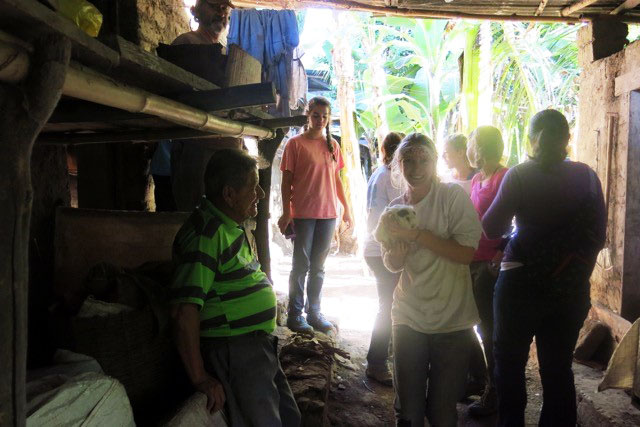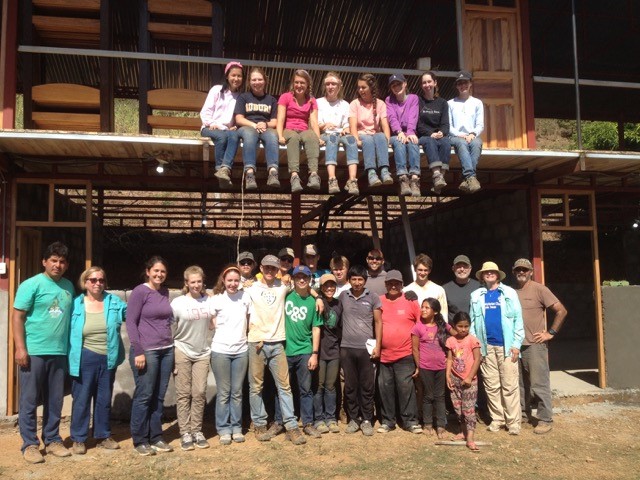A letter from Sara Armstrong serving in Peru
June 2016
Write to Sara Armstrong
Write to Rusty Edmondson
Individuals: Give online to E200530 for Sara Armstrong and Rusty Edmondson’s sending and support
Congregations: Give to D507510 for Sara Armstrong and Rusty Edmondson’s sending and support
Churches are asked to send donations through your congregation’s normal receiving site (this is usually your presbytery).
After eight years here I need to be reminded how strange Peruvian customs are for U.S. visitors, and visa versa. We traveled this week with a mission delegation of 30 people from the U.S. over the Andes Mountains. We passed from the warm steamy jungle and into the clouds and heavy mist as we approached the top of the 14,000-foot Abra Malaga Pass. In the cold rain we made a bathroom stop that really underlined the differences between U.S. and Peruvian cultures. These differences were epitomized by three buildings at the site:
1) The “restaurant.” Our two drivers went in to have a quick meal. Outside, three pigs were waiting politely at the door. The sign out front says “Roasted Pork.” They sat there politely for at least 15 minutes until a woman came out with a bucket of scraps and led them off single file across the road to be fed.
2) The snack shop. Next to the restaurant was a tiny store. Manuel, our translator, was there having a late breakfast and helping our people with purchases. Several of them got back on the bus disappointed that there were no potato chips. They were quite surprised when I boarded with my purchases: sweet potato chips and plantain chips. They hurried back through the rain to buy and try something new.
3) The bathroom. The third building at this tiny roadside community was the bathroom, the reason for our stop. The line formed at the door of the ladies’ side, everyone with toilet paper in hand. The cultural difference here: the toilet did not have a flush lever. They called me over to ask what to do. After all my years here I knew there had to be a water source nearby for flushing the toilet. Indeed, on the side of this new bathroom, there was a faucet with a hose just the right length. It was pretty modern by rural Peruvian standards but a mental leap for the U.S. team members.
This isolated moment in our week together made me think back on other opportunities we had during the week to help people on this team understand and appreciate the differences between cultures. Two teams merged for this trip: Avondale Presbyterian Church in Charlotte, N.C., and First Presbyterian Church of Bryan, Texas. We were invited by the Synod of La Convencion of our partner denomination, the Peruvian Evangelical Church (IEP). The teams worked hard alongside their Peruvian partners to build a Bible Institute and multi-use center in the high jungle of Cusco.The 20 teenagers from Charlotte were thoughtful, well-spoken people, putting their faith in action. When we called halt to hours of work with pick axes and shovels, they collapsed around the lunch tables to enjoy a rest and good food. What they did not realize at first was that their Peruvian brothers and sisters held them in such high esteem and respect that they would not approach the table to sit with them unless they were invited repeatedly. By the fourth day I was delighted to see the young people inviting their Peruvian partners to have a seat and trying their best to communicate despite the language barriers.
In fact, many of the Peruvians were critical of the project supervisor, Pastor Leopoldo Aguilar, for asking the group of youth to start clearing the side of the mountain for a soccer field. In Peru, generally speaking, light-skinned and well-to-do people are not expected to do any heavy labor. The Peruvians had not realized at first that the yells of glee that echoed down the mountain when the youth were finally able to shift a huge rock meant that the group was having a great time attacking the job that they were given.
Matilda, a member of the Women’s League in the largest church in Cusco, accompanied us to supervise the cooking on the adobe ovens and to make sure we ate healthy and clean food. She was delighted to have two members of the church from Bryan sitting with her to help with peeling, washing and food prep for some 60 people each day. Matilda could not believe that the young people were willing to come up the hill and wash dishes, and she refused to let us scrub the huge dirty pots for fear we would get dirty. By the week’s end she was allowing us to help with every part of her hot and exhausting work. [PLACEMENT: Photo of potato peelers #3] She also began to share with team members some of the story of her difficult life.
One day we visited the home/farm of one of the first Protestant Christians in the valley. Alexandra Montoya showed us some of the 8 hectares (almost 20 acres) he has planted in cacao, the primary ingredient for chocolate. The cacao seed pods spring in beautiful colors directly from the trunks of the trees. None of us knew about all the distinct varieties of cacao. When you cut open these eggplant-sized fruits, you find a row of seeds that look like fat corn kernels. Each seed is surrounded by juicy nectar. We tried three different types, each with a slightly different flavor. One was purple; another rare variety is white. The seeds taste like Hershey’s cocoa powder, slightly bitter, chocolatey and dry. He also shared honeycomb from his hive, fresh ground coffee from his trees, and the riches of his gardens such as leaves of a cinnamon tree. He raises cuy (guinea pigs) and ducks. We were fascinated by his nursery, and by the one pet cuy that has the run of the kitchen. It is a way of life very different, on many levels, from that of U.S. urban Christians from Houston, Texas, and Charlotte, North Carolina.
This is our joy, introducing Christians to each other across all that schemes to keep us separated by distance, and divided by all that is strange and different. This team had the unusual opportunities to work side by side with Peruvian Christians and also to visit in their homes. At the same time, we rejoice in the opportunity we had to build something that will last.
Your support for our work makes all of this possible! Thank you for your prayers, for your presence in Peru, for your financial support and for spreading the news of our work building partnerships between the U.S. and Peru. If you haven’t already, please consider making a gift to this ministry or the ministries of Presbyterian mission co-workers like us around the world.
We will be returning to the U.S. this fall for our Interpretation Assignment. If you would like to have us speak at your church, please send us an e-mail at dos_zapatos@yahoo.com. We would love to share more about our work with you!
Sara and Rusty
![]() You may freely reuse and distribute this article in its entirety for non-commercial purposes in any medium. Please include author attribution, photography credits, and a link to the original article. This work is licensed under a Creative Commons Attribution-NonCommercial-NoDeratives 4.0 International License.
You may freely reuse and distribute this article in its entirety for non-commercial purposes in any medium. Please include author attribution, photography credits, and a link to the original article. This work is licensed under a Creative Commons Attribution-NonCommercial-NoDeratives 4.0 International License.
